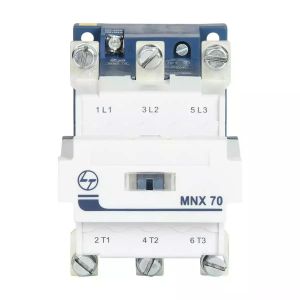
In electrical engineering and industrial automation, contactors play a pivotal role in controlling the flow of electricity to various devices and machinery. Among the different types of contactors, magnetic contactors, single-phase contactors, and three-phase contactors stand out for their distinct applications and functionalities. Let’s delve into the world of contactors, understand their differences, and explore their significance in electrical systems.
Understanding Magnetic Contactors
Magnetic contactors are electromechanical devices used to control the flow of electricity in electric motors and other high-power electrical loads. They consist of a coil, which when energized, generates a magnetic field that attracts an armature, closing the contacts and allowing current to flow through the circuit. Magnetic contactors are commonly used in applications requiring remote or automatic control of motors, such as in industrial machinery, elevators, and conveyor systems.
Key Features of Magnetic Contactors
- Remote Control:
Magnetic contactors can be operated remotely using control signals from switches, relays, or programmable logic controllers (PLCs). This allows for centralized control of multiple motors or electrical loads from a control panel.
- Overload Protection:
Many magnetic contactors are equipped with overload relays, which provide protection against excessive current draw in the motor circuit. In the event of an overload, the contacts of the contactor open, preventing damage to the motor.
- High Switching Capacity:
Magnetic contactors are capable of handling high currents and voltages, making them suitable for controlling large motors and heavy-duty electrical equipment.
- Long Service Life:
With durable construction and reliable operation, magnetic contactors offer a long service life, making them ideal for continuous operation in industrial environments.
Exploring Single Phase Contactors
Single-phase contactors are specialized contactors designed to control single-phase electrical circuits, typically found in residential and commercial applications. They are commonly used in air conditioning units, refrigeration systems, lighting controls, and other single-phase motor applications. Single-phase contactors operate on the same principle as magnetic contactors but are specifically tailored for single-phase power systems.
Characteristics of Single Phase Contactors
- Compact Design:
Single-phase contactors are often compact in size, making them suitable for installation in tight spaces such as electrical panels or control cabinets.
- Simple Operation:
Like magnetic contactors, single-phase contactors are activated by energizing the coil, which closes the contacts and allows current to flow through the circuit.
- Cost-Effective Solution:
Single-phase contactors provide a cost-effective solution for controlling single-phase motors and electrical loads, offering reliable performance at a lower cost compared to larger three-phase contactors.
- Versatile Applications:
Single-phase contactors find application in a wide range of residential and commercial settings, where single-phase power is prevalent. They are commonly used in HVAC systems, pumps, compressors, and lighting controls.
Understanding Three Phase Contactors
Three-phase contactors are designed to control three-phase electrical circuits, which are commonly found in industrial machinery, commercial HVAC systems, and large motor applications. They consist of three sets of contacts, one for each phase of the electrical supply, allowing for the control of three-phase motors and equipment. Three-phase contactors offer robust performance and are essential components in industrial automation and power distribution systems.
Key Attributes of Three Phase Contactors
- Three-Phase Control:
Three-phase contactors are specifically designed to handle three-phase electrical systems, providing reliable control and protection for three-phase motors and equipment.
- High Power Handling Capacity:
Due to their larger size and robust construction, three-phase contactors are capable of handling high currents and voltages associated with three-phase power systems.
- Industrial Applications:
Three-phase contactors are widely used in industrial settings, where they provide essential control and protection for motors, pumps, conveyors, and other heavy-duty machinery.
- Remote Control and Monitoring:
Many three-phase contactors are equipped with auxiliary contacts for remote control and monitoring, allowing for integration with control systems and remote operation of equipment.
Read Also – Electrical Contactors: How They Work And What Are They Used For?
Choosing the Right Contactor for Your Application
In summary, magnetic contactors, single-phase contactors, and three-phase contactors each serve specific purposes in electrical systems, catering to different voltage requirements, power ratings, and applications. While magnetic contactors excel in industrial automation and motor control, single-phase contactors offer cost-effective solutions for residential and commercial settings with single-phase power. On the other hand, three-phase contactors are indispensable components in industrial power distribution and motor control systems.
When selecting a contactor for your application, it’s essential to consider factors such as voltage rating, current capacity, load type, and environmental conditions. By understanding the differences between magnetic contactors, single-phase contactors, and three-phase contactors, you can make informed decisions to ensure the efficient and reliable operation of your electrical systems. Whether you’re controlling a small motor in a residential HVAC system or managing a complex industrial process, choosing the right contactor is crucial for safety, performance, and longevity.
